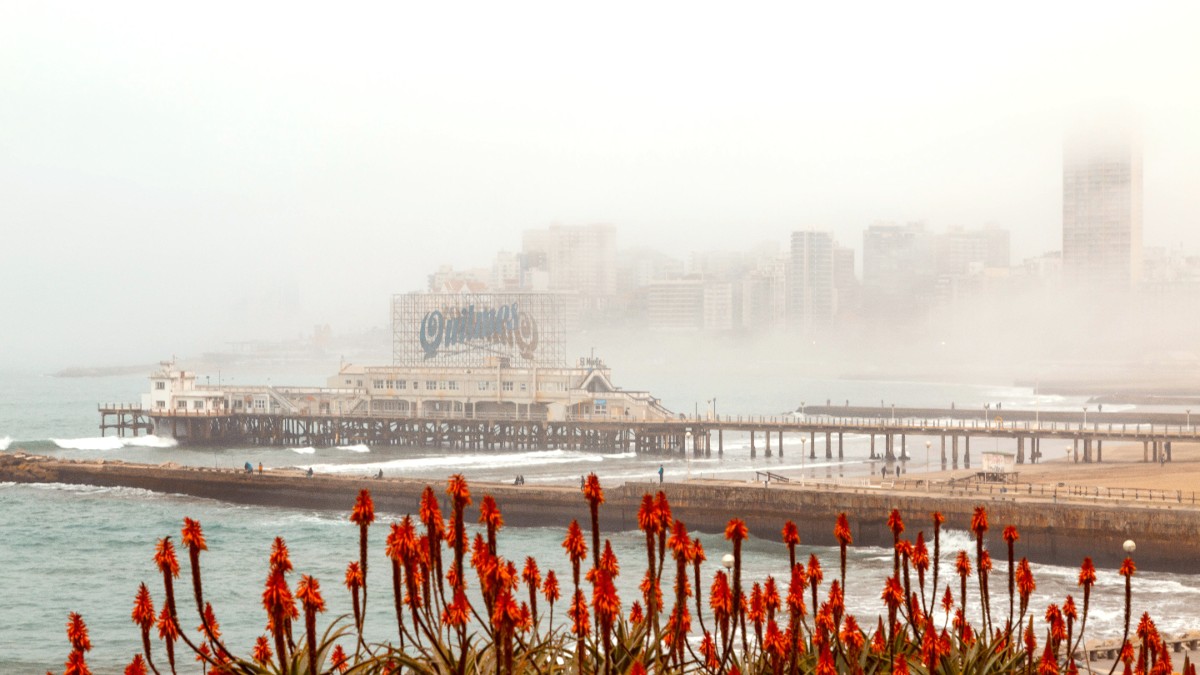
Atlantic Coast, Argentina
The city experiences a temperate oceanic climate, meaning mild temperatures year-round, without extreme heat or cold. Rainfall often occurs as thunderstorms in summer, clearing quickly. Humidity levels remain moderate.
The weather can vary, with increasing warmth towards late spring. Mar del Plata does not experience monsoons or hurricanes. Extreme temperatures are rare, but heatwaves can occur in summer, pushing temperatures above average. In winter, cold snaps with temperatures near freezing are possible. Strong winds are common, especially in spring, which impact beach comfort and some outdoor activities.
Mar del Plata does not experience monsoons or hurricanes. Extreme temperatures are rare, but heatwaves occur in summer.
Strong winds are common, especially in spring, which impact beach comfort and some outdoor activities. In winter, cold snaps with temperatures near freezing are possible.
(Mid-December to February)
Warmest weather, ideal for beach activities. Lively atmosphere with many events and festivals.
Crowded beaches, higher prices for accommodation and services. Advance bookings are a must-have.
(March-April, October-November)
Pleasant weather without peak crowds. Good for sightseeing and cultural exploration.
Some beach services may operate at reduced capacity. Ocean water can be cooler for swimming.
(May-September)
Significantly lower prices and minimal crowds. Ideal for cultural pursuits and local experiences.
Cold weather means beach services are largely closed. Nightlife options are limited.
The period from December to February is best for enjoying the beaches and swimming.
Surfing is a year-round activity. The best waves often arrive in autumn and winter when swell is more consistent, though temperatures are cooler. A Men's full wetsuit or Women's full wetsuit keeps you comfortable outside of peak summer months.
Shoulder seasons offer pleasant temperatures and fewer crowds.
Ideal for museums, historical sites, and neighborhoods.
Consistent waves, though cooler temperatures prevail.
Peak summer for sunbathing and swimming.
Most active during the high season.
Most travelers find the process straightforward. Check specific requirements well in advance of your trip.
Many nationalities, including citizens of the United States, Canada, Australia, New Zealand, the United Kingdom, and the European Union, do not require a visa for tourist stays of up to 90 days. A valid passport is sufficient for these travelers.
Argentina currently has no reciprocity fees for citizens of the United States, Canada, or Australia. These fees were suspended in 2016.
Argentina currently does not mandate specific health requirements for general tourists.
Health organizations advise certain vaccinations for travelers, though these are not a condition for entry.
Mar del Plata has both public and private healthcare facilities. Pharmacies are widely available throughout the city, and pharmacists often provide basic advice for minor ailments.
Argentina's economic situation makes understanding currency and exchange rates especially useful. Prices below are estimates from mid-2024, subject to change due to inflation.
The Argentine Peso (ARS) is the currency. Argentina has experienced significant economic volatility, leading to multiple exchange rates. The "official" rate is set by the central bank. The "blue dollar" (dólar blue) or parallel market rate typically offers significantly more pesos per U.S. Dollar (and sometimes Euro), making it the most advantageous for tourists bringing foreign cash.
When you pay with international credit/debit cards, transactions process at the official rate. However, a "MEP dollar" or "tourist dollar" rate often applies, which is more favorable than the official rate and closer to the "blue dollar," supplying a competitive exchange. Check with your bank for foreign transaction fees. Using a card that charges no foreign transaction fees, like the Amazon Prime Rewards Visa Signature Card, presents an advantage.
A daily budget for those focused on economical options, including hostel stays, street food, and public transport.
Accommodation: ARS 15,000 - 30,000 (Hostel dorm bed)
Total Daily: ARS 28,000 - 57,000 (Approx. USD 25-50)
A comfortable budget for mid-range hotels, local restaurants, and some paid activities.
Accommodation: ARS 35,000 - 70,000 (Mid-range hotel)
Total Daily: ARS 66,000 - 133,000 (Approx. USD 60-120)
A generous budget for premium hotels, fine dining, and exclusive experiences.
Accommodation: ARS 80,000 - 200,000+ (Luxury hotel)
Total Daily: ARS 152,000 - 360,000+ (Approx. USD 140-330+)
| Category | Item | Price Range (ARS) |
|---|---|---|
| Accommodation | Hostel dorm bed | 15,000 - 30,000 |
| Meals | Lunch menu (menu ejecutivo) | 7,000 - 15,000 |
| Transportation | Local bus (SUBE card) | 700 - 1,000 per ride |
Prioritizing health and safety leads to a more enjoyable trip.
No vaccinations are required for entry to Argentina for most common nationalities.
Ensure you are up-to-date on MMR, Diphtheria-Tetanus-Pertussis, Polio, Chickenpox, and your annual Flu shot.
Hepatitis B and Rabies may be suggested depending on activities. Consult your doctor for personalized advice.
Prevention Strategies
These steps help avoid common health issues. Dengue fever risk is generally low in Mar del Plata.
Sun can be intense; utilize Sunscreen. Mosquitoes may be present, especially in warmer months, so Insect repellent with DEET or picaridin is useful.
Bring a Traveler's first aid kit with Anti-diarrheal medication like Imodium.
Mar del Plata has both public (HIGA) and private (Clínica 25 de Mayo, Sanatorio Allende) healthcare facilities.
Widely available. Pharmacists often provide basic advice for minor ailments.
Medical Emergency (Ambulance - SAME): 107; Police: 911 (general) or 101 (local); Fire Department (Bomberos): 100.
Mar del Plata is generally safe for tourists. Like any large city, petty crime, like pickpocketing or bag snatching, occurs, especially in crowded tourist areas.
Crowded beaches (Playa Bristol), bus stations, and busy downtown streets (e.g., Peatonal San Martín) present more common pickpocketing scenarios.
Upscale residential areas like Los Troncos, Playa Grande, and Güemes are generally very safe and pleasant for walking.
Be aware of your surroundings, avoid openly displaying expensive items. Keep valuables secure; a Money belt is useful. Use licensed taxis or reputable ride-sharing apps. Avoid walking alone in poorly lit areas at night.